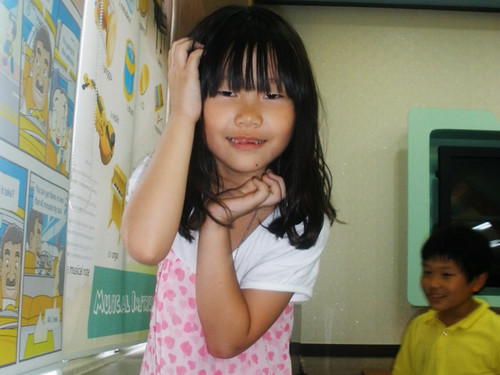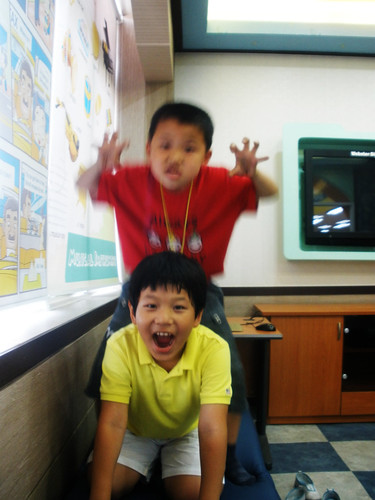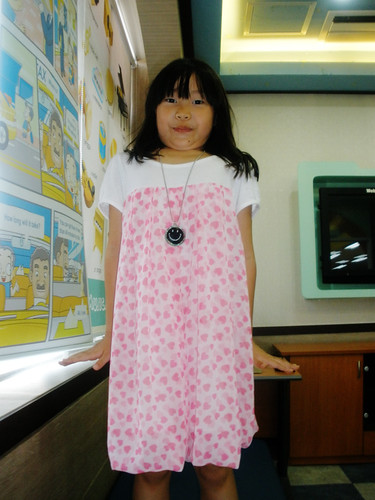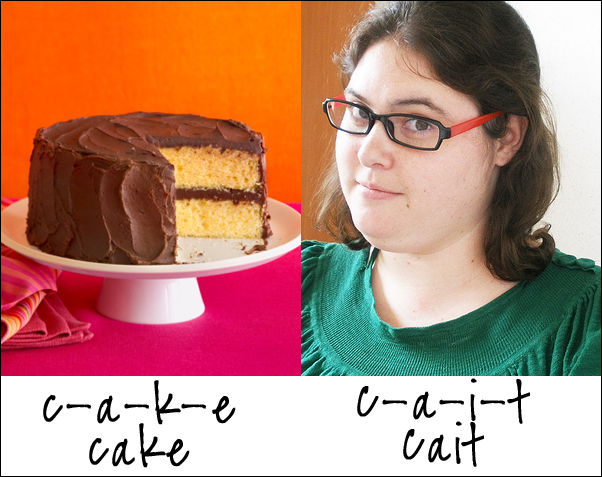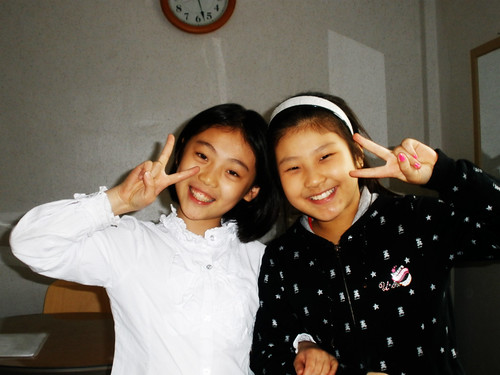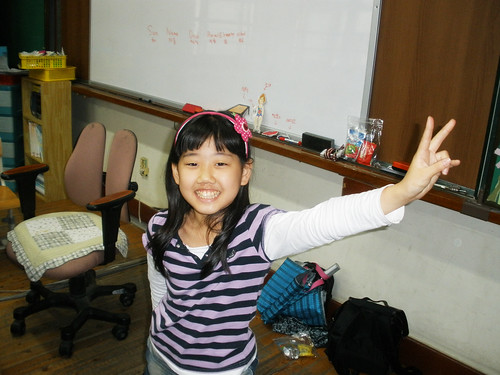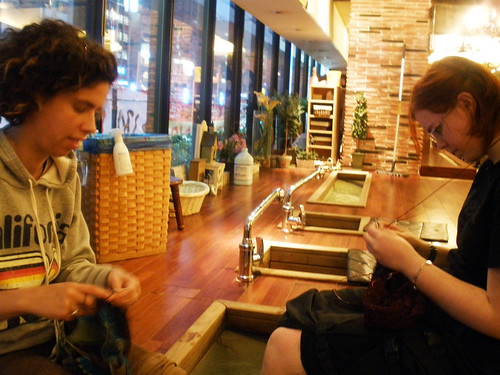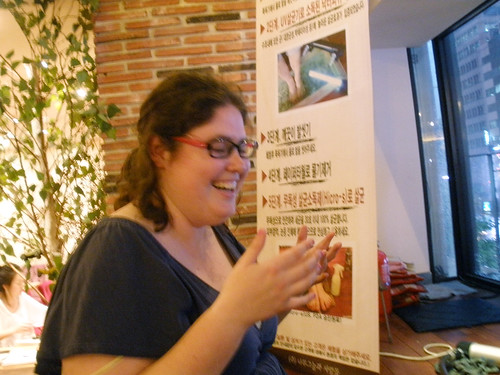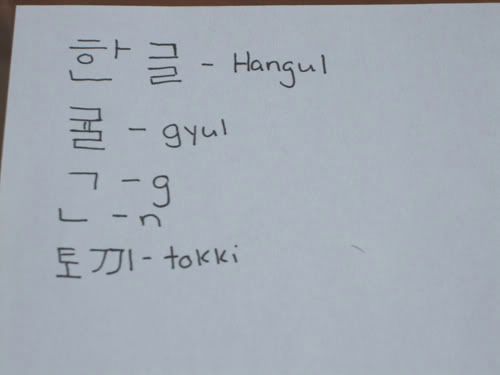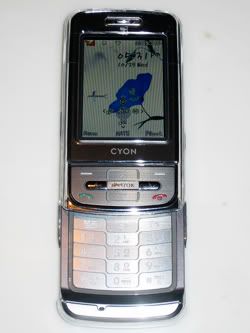On what was suppose to be Riah's last evening in Korea, we (Audrey, Caroline, Riah, Siobhain and I - the ladies I spent Christmas with) were sitting in Cold Stone in Gangnam, feeling morose, when Caroline suggested we make a scrapbook as a going away present. She had a Polaroid camera. I had many different colors of pens. We had a notebook and stickers. And scissors. And tape. Look, I'm friends with a very crafty group of people, okay!

I love that I'm friends with a group of people who, when someone suggests making an impromptu goodbye scrapbook, ACTUALLY have all the necessary supplies on hand.
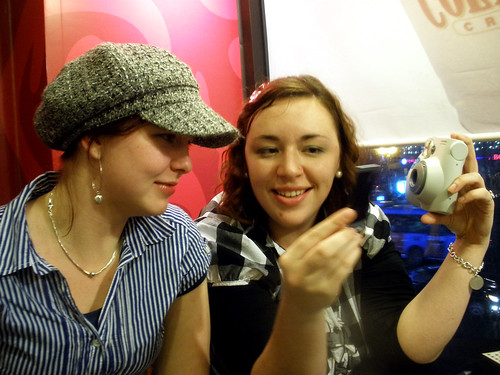
Caroline and Siobhain examining a Polaroid.
And so we made a scrapbook. It was a rush job; Cold Stone kicked us out at 11:00, the Coffee Bean we relocated to kicked us out half an hour later and Audrey and I needed to catch the last train home at midnight. The first half of the scrapbook was detailed (or at least had interesting asides) and had introductions and dinosaurs and fun lessons learned in Korea (even in Korea, don't assume people don't understand English is an important one) while the second half consisted of unannotated Polaroid pictures hastily taped onto blank pages while the Coffee Bean employees gave us the side eye for still being in their shop ten minutes after closing.
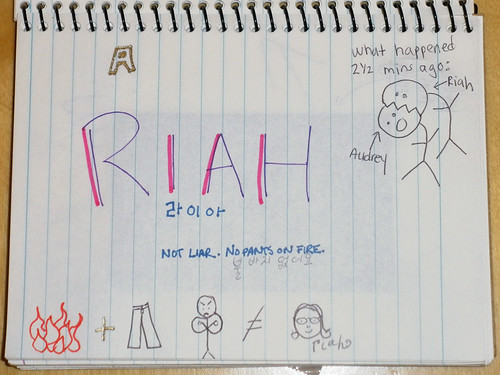
Riah's introduction page. When pronounced with a Korean accent, Riah sounds an awful lot like the word liar, so Riah specified that her pants were not on fire. And, underneath No Pants On Fire, I added 불 바지 없어요, which says, in what I'm sure is truly atrocious Korean, No Fire Pants. It was hilarious at the time.
We adjourned to the street outside to say our final goodbyes, which were awful. Saying goodbye is never fun, but it's especially hard in such a ephemeral community because Korea, our common ground, isn't a permanent location for any of us. My group of friends from university still meets up in Chapel Hill periodically, but the odds of seeing this group of girls again in the US are slim. Also, for me, saying goodbye to Riah was the first on a long list of goodbyes I have to say this month.
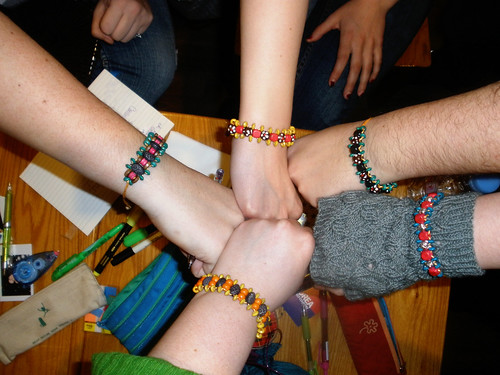
Riah gave us matching bracelets from Cambodia as a going away present.
So, we were standing on the street of Gangnam crying and promising to write and it's awful and cold and then Audrey and I realized that if we want to get home, we have to leave RIGHT NOW, only we didn't realize the time quite soon enough and just missed our last transfer. I've just barely caught a lot of last trains home, but in two years of living here, this was the first time I actually missed it.
Luckily, we were both able to find taxis willing to drive out to where we live with minimal fuss.
I woke up the next day, Wednesday morning, to an email from Riah. The snowstorm that ate Chicago (are we calling this one Snowpocalypse?) meant that O'Hare was closed and Riah was stuck in Korea until Friday night. Suck it, Chicago. On Thursday, Riah, Audrey and I went to COEX, and during our shopping breaks, we finished the scrapbook. We captioned the photos and wrote lists based on our experience here: crazy English names Korean children give themselves, Things We <3 About Korea, Places we <3 in Korea, How to Anger a Korean, Important Konglish Words, Important Korean Words.
Our list of Important Korean Words is possible the most worthless list of Korean ever and contains such gems as kimchi dumplings, old woman, fleece lined pants and fish (the animal, not the kind you eat). Others - Samsung, Hyundai, soju (Korean rice liquour, like drinking rocket fuel) and bulgogi (Korean barbecued beef) - don't even have an English translation. We had more, actually useful, words, but it turns out we don't know how to spell the Korean we use the most. We spent five minutes trying to figure out how to write thank you, a word I say ALL THE TIME.
After several failed attempts, I said, "You know, we are surrounded by people who know how to write 감사합니다."
We looked around at the cafe, full of Koreans. "Yeah," Riah and Audrey said.
"We could, you know, ask any one of them."
"Yeah," they said again. We stayed seated and left thank you off our list.
Audrey and I said goodbye to Riah again Friday afternoon, after spending the morning at the jimjabang. It still sucked, and I still cried, but it was easier the second time. It was easier when we weren't rushed. It was also easier because, during her extra days, Riah and I made plans to take a road trip once we're both back in the States. Wisconsin and North Carolina aren't that far apart.
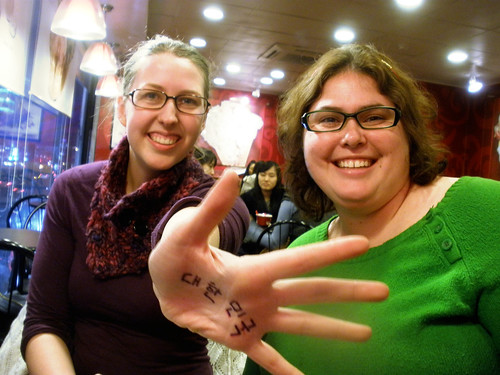
Me and Riah

